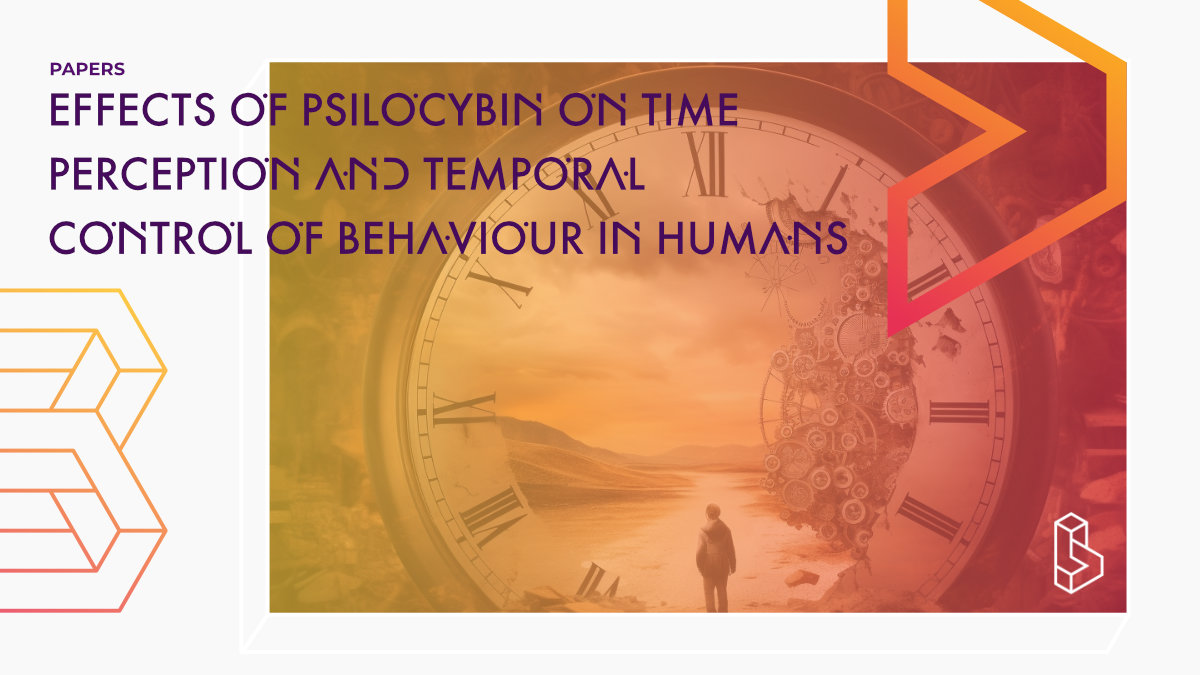This double-blind placebo-controlled study (n=12) finds that psilocybin (8-17,5mg/70kg) impairs people’s ability to process/reproduce beats at longer intervals than 2 to 3 seconds. The authors link this impairment to serotonin (5-HT2A) receptor stimulation.
Abstract of Effects of psilocybin on time perception and temporal control of behaviour in humans
“Hallucinogenic psilocybin is known to alter the subjective experience of time. However, there is no study that systematically investigated objective measures of time perception under psilocybin. Therefore, we studied dose-dependent effects of the serotonin (5-HT)2A/1A receptor agonist psilocybin (4-phosphoryloxy-N, N-dimethyltryptamine) on temporal processing, employing tasks of temporal reproduction, sensorimotor synchronization and tapping tempo. To control for cognitive and subjective changes, we assessed spatial working memory and conscious experience. Twelve healthy human volunteers were tested under placebo, medium (115μg/kg), and high (250μg/kg) dose conditions, in a double-blind experimental design. Psilocybin was found to significantly impair subjects’ ability to (1) reproduce interval durations longer than 2.5 sec, (2) to synchronize to inter-beat intervals longer than 2 sec and (3) caused subjects to be slower in their preferred tapping rate. These objective effects on timing performance were accompanied by working-memory deficits and subjective changes in conscious state, namely increased reports of ‘depersonalization’ and ‘derealization’ phenomena including disturbances in subjective ‘time sense.’ Our study is the first to systematically assess the impact of psilocybin on timing performance on standardized measures of temporal processing. Results indicate that the serotonin system is selectively involved in duration processing of intervals longer than 2 to 3 seconds and in the voluntary control of the speed of movement. We speculate that psilocybin’s selective disruption of longer intervals is likely to be a product of interactions with cognitive dimensions of temporal processing -presumably via 5-HT2A receptor stimulation.“
Authors: Marc Wittmann, Olivia Carter, Felix Hasler, B. Rael Cahn, Ulrike Grimberg, Philipp Spring, Daniel Hell, Hans Flohr & Franz X. Vollenweider
Summary of Effects of psilocybin on time perception and temporal control of behaviour in humans
The brain processes temporal information adequately for the control of perception and action. Different temporal-processing mechanisms are implemented in distinct circumscribed neural circuitries.
Patients with structural damage to the brain, dysfunctions of the dopaminergic system, and older adults can show substantial impairments in temporal processing. These findings are discussed concerning alterations on several information-processing stages related to time processing, specifically a clock, memory and decision stage.
Recent research suggests that a dysbalance between serotonin, glutamate and dopamine neurotransmitter systems may be critical to psychotic symptom formation. Specifically, the serotonin 5-HT1A/2A receptor systems are involved in psychotic symptom formation.
Further Notes
This paper is included in the meta-analytical review by Galvão-Coelho and colleagues (2021) that found psychedelics to improve mood (for those with mood disorders) both in the short and long-term (up to 60 days).
Find this paper
Effects of psilocybin on time perception and temporal control of behaviour in humans
https://doi.org/10.1177%2F0269881106065859
Open Access | Google Scholar | Backup | 🕊
Cite this paper (APA)
Wittmann, M., Carter, O., Hasler, F., Cahn, B. R., Grimberg, U., Spring, P., ... & Vollenweider, F. X. (2007). Effects of psilocybin on time perception and temporal control of behaviour in humans. Journal of Psychopharmacology, 21(1), 50-64.
Study details
Compounds studied
Psilocybin
Topics studied
Healthy Subjects
Study characteristics
Original
Placebo-Controlled
Double-Blind
Within-Subject
Randomized
Participants
12
Humans
Authors
Authors associated with this publication with profiles on Blossom
Franz VollenweiderFranz X. Vollenweider is one of the pioneering psychedelics researchers, currently at the University of Zurich. He is also the director of the Heffter (sponsored) Research Center Zürich for Consciousness Studies (HRC-ZH).
Institutes
Institutes associated with this publication
University of ZurichWithin the Department of Psychiatry, Psychotherapy and Psychosomatics at the University of Zurich, Dr Mialn Scheidegger is leading team conducting psychedelic research and therapy development.
Compound Details
The psychedelics given at which dose and how many times
Psilocybin 8 - 17.5mg | 2x
Linked Research Papers
Notable research papers that build on or are influenced by this paper
Effects of varied doses of psilocybin on time interval reproduction in human subjectsThis double-blind, placebo-controlled, within-subjects study (n=21) investigated the effects of psilocybin (0.84, 8.05, & 17.5mg/70kg) on time perception and found that it increased the loss rate of internal time representation even within the microdose range. This may indicate psilocybin's subjective effects, such as the experience of ‘time standing still'.

